- Online car rental since 2005
- Popular countries
- Popular regions
- Popular cities
- Popular airports
- Car Rental Italy
- Car Rental Spain
- Car Rental United States
- Car Rental Portugal
- Car Rental South Africa
- Car Rental France
- Car Rental Netherlands
- Car Rental Germany
- Car Rental United Kingdom
- Car Rental Greece
- Car Rental Austria
- Car Rental Switzerland
- Car Rental Croatia
- Car Rental Belgium
- Car Rental Norway
- Car Rental Ireland
- Car Rental Denmark
- Car Rental Australia
- Car Rental Canada
- Car Rental Sweden
- Car Rental Florida
- Car Rental England
- Car Rental California
- Car Rental Sicily
- Car Rental Mallorca
- Car Rental Tenerife
- Car Rental Sardinia
- Car Rental Ibiza
- Car Rental Madeira
- Car Rental Crete
- Car Rental Gran Canaria
- Car Rental Scotland
- Car Rental Azores
- Car Rental Malta
- Car Rental Corsica
- Car Rental Lanzarote
- Car Rental Fuerteventura
- Car Rental Rhodes
- Car Rental Corfu
- Car Rental La Palma
- Car Rental Amsterdam
- Car Rental Milan
- Car Rental Miami
- Car Rental Lisbon
- Car Rental Malaga
- Car Rental Porto
- Car Rental Cape Town
- Car Rental Rome
- Car Rental Alicante
- Car Rental Bergamo
- Car Rental Barcelona
- Car Rental London
- Car Rental Faro
- Car Rental Orlando
- Car Rental Munich
- Car Rental Vienna
- Car Rental Nice
- Car Rental Johannesburg
- Car Rental Bari
- Car Rental Madrid
- Car Rental Amsterdam Schiphol Airport
- Car Rental Miami International Airport
- Car Rental Lisbon Airport
- Car Rental Malaga Airport
- Car Rental Porto Airport
- Car Rental Milan Malpensa Airport
- Car Rental Alicante Airport
- Car Rental Rome Fiumicino Airport
- Car Rental Bergamo Airport
- Car Rental Faro Airport
- Car Rental Cape Town Airport - International Terminal
- Car Rental Orlando International Airport
- Car Rental Barcelona Airport
- Car Rental Vienna Airport
- Car Rental Munich Airport
- Car Rental Mallorca Airport
- Car Rental Bari Palese Airport
- Car Rental Nice Airport
- Car Rental Bologna Airport
- Car Rental Los Angeles International Airport
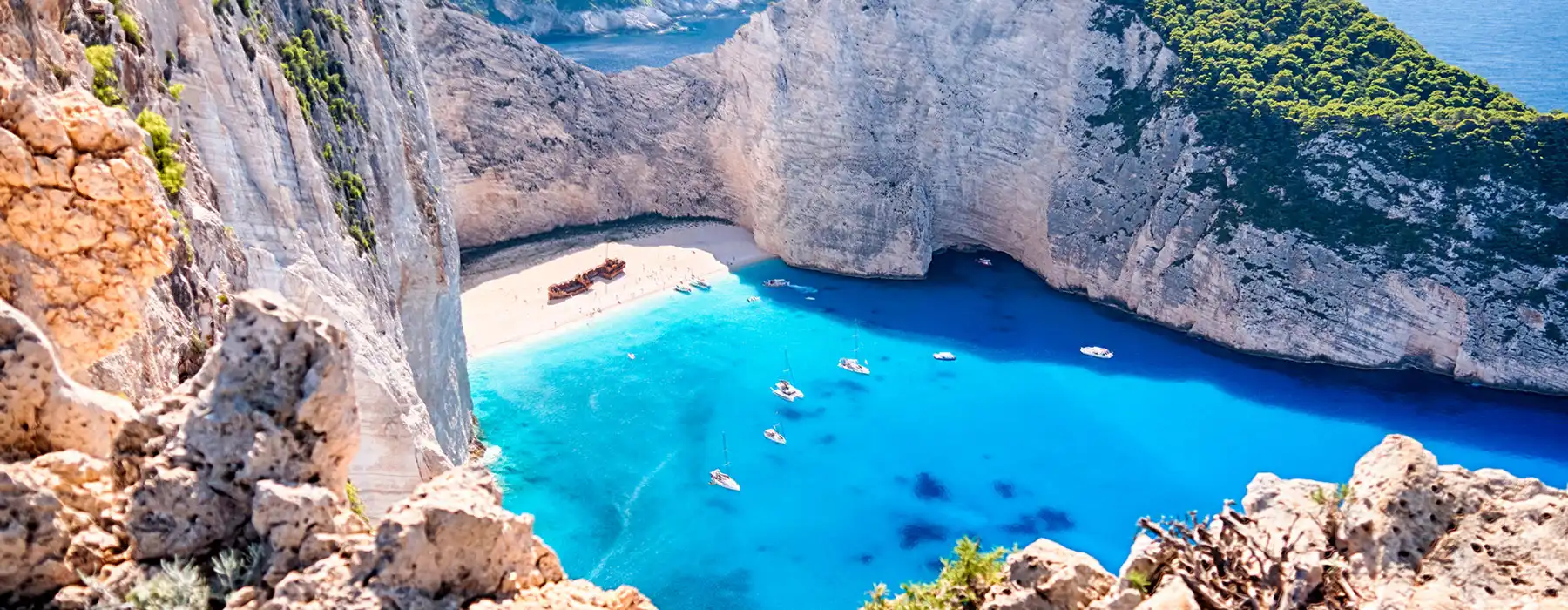
Car Rental Greece
Save time and money. We compare the offers of car rental companies in Greece on your behalf.
- Free cancellation Up to 48 hours prior to the scheduled pick-up time
- Best price guarantee Have you found a better price? Let us know and we will make you a better offer.
- 24000+ pick-up locations Locations around the world

Car Rental Greece
EasyTerra Car Rental Greece is an independent car rental comparison site. Our site compares prices from well-known car rental companies so that, as a customer, you can always reserve your car with us at a competitive rate.
Car rental offers in Greece
Whether you're looking for a small rental car or a station wagon for the entire family, we will always have a suitable vehicle at the lowest price. Below are some examples from our selection in Greece.

-
Green Motion From€ 2 /day -
SurPrice car rentals From€ 2 /day -
Volta4u From€ 2 /day

-
Green Motion From€ 2 /day -
Sixt From€ 11 /day -
Carwiz rent a car From€ 13 /day

-
Carwiz rent a car From€ 5 /day -
Volta4u From€ 5 /day -
Drive Hellas From€ 5 /day

-
Volta4u From€ 2 /day -
Carwiz rent a car From€ 2 /day -
Record Go From€ 3 /day

-
SurPrice car rentals From€ 2 /day -
Goldcar From€ 4 /day -
Carwiz rent a car From€ 6 /day

-
SurPrice car rentals From€ 5 /day -
Volta4u From€ 5 /day -
Green Motion From€ 5 /day

-
Goldcar From€ 2 /day -
National Car Rental From€ 15 /day

-
Record Go From€ 3 /day -
Green Motion From€ 3 /day -
Goldcar From€ 3 /day

-
SurPrice car rentals From€ 5 /day -
Autounion Car Rental From€ 10 /day -
Carwiz rent a car From€ 12 /day

-
Carwiz rent a car From€ 2 /day -
Enterprise From€ 11 /day -
Alamo From€ 11 /day

-
Volta4u From€ 3 /day -
Carwiz rent a car From€ 3 /day -
wheego From€ 4 /day

-
Carwiz rent a car From€ 5 /day -
Enterprise From€ 14 /day -
Alamo From€ 15 /day

-
SurPrice car rentals From€ 3 /day

-
Goldcar From€ 3 /day -
Drive Hellas From€ 5 /day -
Europcar From€ 10 /day

-
Volta4u From€ 5 /day -
SKG Rent A Car From€ 7 /day -
Yours Carrental From€ 7 /day

-
Goldcar From€ 3 /day -
Green Motion From€ 3 /day -
SurPrice car rentals From€ 3 /day

-
Green Motion From€ 3 /day -
OK Mobility From€ 4 /day -
Centauro From€ 6 /day

-
SurPrice car rentals From€ 5 /day

-
SurPrice car rentals From€ 3 /day

-
Carwiz rent a car From€ 3 /day -
Drive Hellas From€ 4 /day -
wheego From€ 4 /day

-
Carwiz rent a car From€ 5 /day -
Volta4u From€ 6 /day -
Drive Hellas From€ 6 /day

-
SurPrice car rentals From€ 3 /day -
Carwiz rent a car From€ 4 /day -
SKG Rent A Car From€ 6 /day

-
Carwiz rent a car From€ 3 /day

-
SurPrice car rentals From€ 5 /day

-
Goldcar From€ 3 /day -
Europcar From€ 16 /day -
National Car Rental From€ 20 /day

-
Goldcar From€ 3 /day -
Drive Hellas From€ 7 /day -
Exer Rent A Car From€ 10 /day

-
SurPrice car rentals From€ 6 /day -
Carwiz rent a car From€ 8 /day -
SKG Rent A Car From€ 8 /day

-
SurPrice car rentals From€ 4 /day -
Carwiz rent a car From€ 4 /day -
Caldera From€ 12 /day

-
SurPrice car rentals From€ 4 /day -
Carwiz rent a car From€ 49 /day

-
SurPrice car rentals From€ 7 /day -
Carwiz rent a car From€ 11 /day -
Caldera From€ 18 /day

-
Carwiz rent a car From€ 4 /day -
Alamo From€ 24 /day -
Enterprise From€ 26 /day

-
SurPrice car rentals From€ 4 /day -
Green Motion From€ 4 /day -
Carwiz rent a car From€ 6 /day

-
Green Motion From€ 9 /day -
Drive Hellas From€ 12 /day -
Exer Rent A Car From€ 14 /day

-
SurPrice car rentals From€ 4 /day

-
Record Go From€ 4 /day -
Enterprise From€ 16 /day -
Alamo From€ 17 /day

-
SurPrice car rentals From€ 10 /day -
Carwiz rent a car From€ 56 /day

-
SurPrice car rentals From€ 5 /day -
Royal Rent a Car Crete From€ 23 /day

-
SurPrice car rentals From€ 5 /day -
Alamo From€ 25 /day -
Caldera From€ 30 /day

-
SurPrice car rentals From€ 8 /day

-
SurPrice car rentals From€ 5 /day

-
Carwiz rent a car From€ 7 /day

-
SurPrice car rentals From€ 11 /day -
Royal Rent a Car Crete From€ 27 /day

-
SKG Rent A Car From€ 10 /day

-
SKG Rent A Car From€ 13 /day

-
SurPrice car rentals From€ 10 /day

-
Carwiz rent a car From€ 18 /day -
Autounion Car Rental From€ 30 /day -
Exer Rent A Car From€ 32 /day

-
Carwiz rent a car From€ 19 /day -
Europcar From€ 30 /day

-
Alamo From€ 27 /day -
National Car Rental From€ 39 /day

-
SurPrice car rentals From€ 20 /day -
Green Motion From€ 21 /day -
Abbycar From€ 27 /day

-
SurPrice car rentals From€ 20 /day -
Green Motion From€ 23 /day -
Drive Hellas From€ 28 /day

-
Alamo From€ 28 /day -
Enterprise From€ 32 /day -
National Car Rental From€ 40 /day

-
SurPrice car rentals From€ 20 /day -
SK Rent From€ 41 /day

-
SurPrice car rentals From€ 21 /day

-
Enterprise From€ 28 /day

-
SKG Rent A Car From€ 12 /day

-
SurPrice car rentals From€ 14 /day

-
SKG Rent A Car From€ 15 /day

-
Carwiz rent a car From€ 20 /day -
Goldcar From€ 25 /day -
Abbycar From€ 33 /day

-
Carwiz rent a car From€ 24 /day -
Abbycar From€ 34 /day -
Europcar From€ 44 /day

-
SKG Rent A Car From€ 21 /day

-
SurPrice car rentals From€ 21 /day -
Green Motion From€ 30 /day -
Volta4u From€ 31 /day

-
SurPrice car rentals From€ 26 /day

-
SurPrice car rentals From€ 24 /day

-
SKG Rent A Car From€ 11 /day -
Europcar From€ 14 /day -
Sixt From€ 15 /day

-
SurPrice car rentals From€ 13 /day

-
SKG Rent A Car From€ 15 /day -
Europcar From€ 17 /day -
Sixt From€ 20 /day

-
SurPrice car rentals From€ 13 /day -
Sixt From€ 18 /day

-
Autounion Car Rental From€ 13 /day -
SKG Rent A Car From€ 18 /day -
Yours Carrental From€ 18 /day

-
Autounion Car Rental From€ 17 /day -
SKG Rent A Car From€ 20 /day -
Yours Carrental From€ 22 /day

-
Yours Carrental From€ 14 /day -
Europcar From€ 15 /day -
SurPrice car rentals From€ 34 /day

-
Carwiz rent a car From€ 15 /day -
SurPrice car rentals From€ 16 /day

-
Europcar From€ 18 /day -
Yours Carrental From€ 24 /day

-
Carwiz rent a car From€ 18 /day -
Green Motion From€ 25 /day -
SKG Rent A Car From€ 29 /day

-
Carwiz rent a car From€ 20 /day -
Goldcar From€ 25 /day -
Green Motion From€ 27 /day

-
Carwiz rent a car From€ 24 /day -
Abbycar From€ 34 /day -
Europcar From€ 44 /day

-
SurPrice car rentals From€ 20 /day -
Green Motion From€ 21 /day -
Drive Hellas From€ 22 /day

-
SurPrice car rentals From€ 20 /day -
Green Motion From€ 23 /day -
Volta4u From€ 25 /day

-
Abbycar From€ 28 /day -
Autounion Car Rental From€ 35 /day -
Volta4u From€ 76 /day

-
SurPrice car rentals From€ 20 /day -
SK Rent From€ 41 /day

-
SurPrice car rentals From€ 21 /day -
Green Motion From€ 30 /day -
Volta4u From€ 31 /day

-
Carwiz rent a car From€ 33 /day -
Europcar From€ 41 /day -
Autounion Car Rental From€ 45 /day

-
Goldcar From€ 4 /day -
Europcar From€ 9 /day -
wheego From€ 10 /day

-
Europcar From€ 12 /day -
Yours Carrental From€ 16 /day -
Volta4u From€ 17 /day

-
Green Motion From€ 15 /day

-
Green Motion From€ 15 /day

-
Enterprise From€ 27 /day -
Hertz From€ 38 /day -
Alamo From€ 42 /day

-
Autounion Car Rental From€ 21 /day

-
Enterprise From€ 22 /day -
Green Motion From€ 28 /day -
Hertz From€ 32 /day

-
Autounion Car Rental From€ 27 /day

-
Volta4u From€ 24 /day -
Royal Rent a Car Crete From€ 57 /day

-
Record Go From€ 4 /day -
Goldcar From€ 5 /day -
Drive Hellas From€ 5 /day

-
SurPrice car rentals From€ 4 /day -
OK Mobility From€ 4 /day -
Volta4u From€ 13 /day

-
SKG Rent A Car From€ 11 /day -
Thrifty From€ 20 /day -
Sixt From€ 22 /day

-
Carwiz rent a car From€ 4 /day -
Centauro From€ 6 /day -
Thrifty From€ 12 /day

-
Drive Hellas From€ 4 /day -
Carwiz rent a car From€ 4 /day

-
Record Go From€ 12 /day -
Enterprise From€ 57 /day -
National Car Rental From€ 59 /day

-
OK Mobility From€ 4 /day -
Goldcar From€ 4 /day -
Exer Rent A Car From€ 11 /day

-
Goldcar From€ 4 /day -
wheego From€ 5 /day -
National Car Rental From€ 20 /day

-
SKG Rent A Car From€ 12 /day -
Enterprise From€ 18 /day -
Alamo From€ 22 /day

-
Europcar From€ 8 /day

-
Europcar From€ 10 /day

-
Europcar From€ 12 /day

-
Europcar From€ 10 /day -
Avis From€ 12 /day -
Sixt From€ 13 /day

-
Europcar From€ 12 /day

-
Avis From€ 12 /day -
Drive Hellas From€ 15 /day

-
Europcar From€ 16 /day -
Avis From€ 18 /day -
Sixt From€ 19 /day

-
Avis From€ 14 /day -
wheego From€ 141 /day

-
Hertz From€ 14 /day
Popular cities in Greece
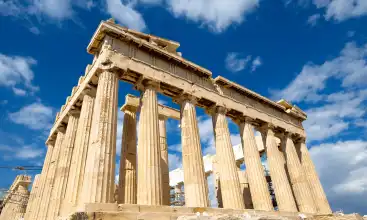

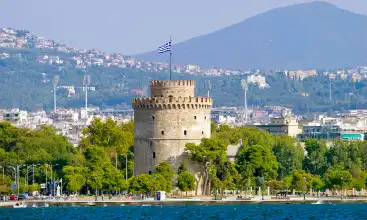
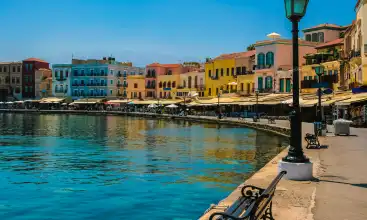
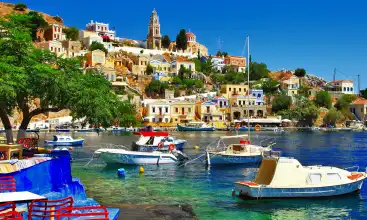
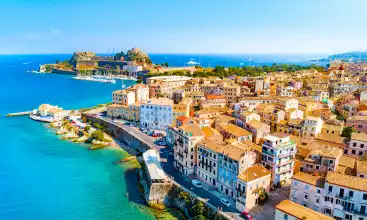
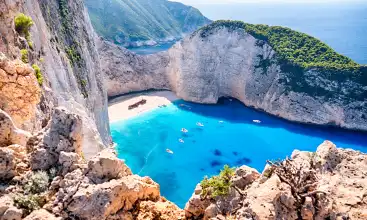
Popular rental locations in Greece
-
Car Rental Athens AirportFrom
€ 2 /day -
Car Rental Heraklion AirportFrom
€ 3 /day -
Car Rental Chalkidiki Macedonia AirportFrom
€ 2 /day -
Car Rental Chania AirportFrom
€ 2 /day -
Car Rental Rhodes AirportFrom
€ 5 /day -
Car Rental Corfu AirportFrom
€ 3 /day -
Car Rental Zakynthos AirportFrom
€ 3 /day -
Car Rental Preveza Aktion AirportFrom
€ 5 /day
Useful tips for a well-prepared trip
Which insurance should I choose, and what's the deal with the deposit? Read our articles with useful information and tips to ensure you choose the right rental car for you.
Car rental locations in Greece
EasyTerra Car Rental compares rental car prices at the following destinations

Location information for Greece
Greece is best explored by rental car. EasyTerra Car Rental has over 173 pick-up locations in Greece. This means there is always a pick-up location close to your destination.
Most popular car hire locations in Greece
Introduction
Greece is a country that consists of many islands. It is a popular holiday destination and is visited annually by millions of tourists. Greece is a country for sun worshippers and culture buffs alike. It has a breathtaking cultural-historical heritage. Greeks, Romans, Byzantines, Venetians and Ottomans have left traces everywhere. In our modern society there are many influences from classical antiquity.
History
The coastlines of the Aegean Sea house the oldest history of Europe. Around 800 BC the Greek cities were founded. People lived from agriculture, fishing and livestock. After an intense struggle between the Spartans and the Athenians, Greece was united and led by Alexander the Great. Alexander was determined to defeat the Persian Empire. He was successful, created a Greek Empire and introduced a new era: the Hellenistic period.
In 168 BC, Greece was conquered by the Romans. Greece was added to the Roman Empire and was given the name Achaia. Greek culture did not get lost. The Roman Empire was split up in 395 AD, into a Western Roman Empire, with its capital in Rome, and an Eastern Roman Empire, with its capital in Constantinople. The western part soon went downhill, while the eastern part flourished tremendously. This part later became known as the Byzantine Empire. The empire included Greece, and was centered around Constantinople (present-day Istanbul).
The Byzantine Empire suffered many enemy attacks. The twelfth and thirteenth century mark the high point of the Byzantine Empire. This Golden Age soon passed; the Empire had to fight against the Romans and the Ottomans. In 1453, the Ottoman invasion started. The centre of the Byzantine Empire, Constantinople, fell into Ottoman hands.
During the Ottoman occupation, Greece maintained its ethnicity, culture and language. The Greek-Orthodox Church played an important role in this. In 1829, Greece declared its independence from the Ottoman Empire. With the help of France, Great Britain and Russia the Greeks expelled the Ottomans. Greece became a monarchy. The Greek king Otto was born in Salzburg. France, Great Britain and Russia wanted the country to be governed by an outsider. Greece became an independent monarchy under the protection of France, Great Britain and Russia.
During the 19th and 20th centuries, Greece slowly gained ground on the Ottomans. Greece, an ally of the Allies, conquered areas during the First World War. The battle between Turkey and Greece reached it high point in 1919. For three years, a war raged between the two countries. In 1923, the king died, and parliament abolished the monarchy. Greece became a republic. However, in 1935 the monarchy was restored after a referendum.
During the Second World War, Greece was occupied by Nazi-Germany. In 1944, the country was released by armies from Great Britain, Australia and New Zealand. Like many countries, Greece had suffered heavily during the war. In part due to America's Marshall Plan, the country managed to rebuild itself. However, the political situation was not stable. There was a coup and a military regime came to power. Communists and political leaders were arrested and mistreated. In 1973, Greece once again became a republic, under President Papadopoulos. In the same year, he was ousted.
Greece no longer wanted to be a member of NATO because the organization had not protested against the Turkish invasion of the Greek island of Cyprus. Nowadays, part of Cyprus is still controlled by the Turks, and the other part is in the hand of the Greeks.
The Cyprus issue brought the regime down. In 1974, Karamanlís came to power. He had returned from Paris, where he had lived as a political refugee. On his arrival he was cheered. Karamanlís founded the conservative political party Nea Dimokratia and won the elections. In 1980, he became president. In 1981, Greece became a member of the European Union. The following decades were characterized by economic growth and prosperity.
Society and Culture
Greece has over 10 million inhabitants (2006). No less than 98% of the people is Greek. A number of the original minorities are Turks, Macedonians and Slavs. About 60% of recent immigrants are from Albania, Bulgaria, Armenia, Rumania, Ukraine, Pakistan and Georgia. The official language is Greek, and it is spoken by 99% of the population.
Most Greeks are members of the Greek-Orthodox Church. 1.3% of the population is Muslim. There are also a number of Roman-Catholics, Protestants and Jews. The Greek-Orthodox Church has always played an important role in Greek culture. Greece is the most religious country within the European Union (with the exception of Malta and Cyprus). The Greeks are emotionally attached to the Orthodox Church and they see it as their natural religion. The Greek constitution guarantees freedom of religion, while defining the Greek-Orthodox Church as the dominant religion. In practice, church and state are closely connected. In 2005, a discussion was started to separate church and state, caused by a corruption scandal among clerical leaders.
Greek culture is thousands of years old and stood at the cradle of western society. Its ancient architecture is still found in many countries. Greek philosophy was also very important for modern-day Western society. In particular the philosophical works by Socrates, Plato and Aristotle have been a major influence. Greek mythology is an important part of the culture. The mythology explains the world which we live in and describes that it's based on a large variety of gods, goddesses, heroes and heroines. Greek mythology was orally transmitted from generation to generation. Well-known figures from this mythology are Achilles, Aphrodite, Heracles and Zeus. There are many more examples of influences of Greek culture in present-day society. For example, the Olympic Games. These games originated in ancient Greece and are held in modern-day society since 1896. In 2004, Greece hosted the games. The country was proud and arranged a resounding success.
Greek people are known for their hospitality. As a tourist you will be treated like a visiting guest and it is entirely possible that people will invite you into their homes. Men are still the dominant gender and they sit together to discuss all kinds of matters. The difference between a woman's life in the country and in the city is enormous. However, in the city, the imbalance between men and women that exists everywhere in Greece is becoming smaller. Family plays an important role within Greek culture. Children live with their parents until, and sometimes even after, they get married.
Political situation
Greece is a parliamentary republic. The president is the head of state and is elected every five years by parliament. The current president of Greece is Karolos Papoulias (since 2005). He is a member of the PASOK (Pan-Hellenic Socialist Movement). This party was founded in 1981 by Papandreou.
The prime minister, the cabinet and parliament play a central role in the political process. The president has limited authorities and many ceremonial functions. At the moment, the government is formed by the ND (New Democratic Party). Since 2004, Karamanlis is the prime minister. The parliament only has one chamber: the House of Representatives, which has 300 members.
In addition to PASOK and the ND, there is a third large political party: Greek National Liberation Front. This party was founded at the start of the Second World War. Originally, it was a Greek resistance movement.
In Greece, everybody of 18 years of age and older is eligible to vote.
Economy
Greece has always been an agrarian country. After the Second World War, industry really started to blossom. While halfway through the last century almost half of the professional population was still active in agriculture, nowadays that is less than 20%. This is still a lot for an EU country. About 20% of the professional population is working in industry. The food and tobacco industry, the confection and textile industry, the chemical industry, the synthetic fiber industry and the paper industry are important industries in Greece. Industry is concentrated around the country's two main cities: Athens and Thessaloniki. The Greek industrial sector is dominated by many small companies. The government is usually responsible for the large companies.
No fewer than 60% of all Greeks work in the services sector. Millions of tourists come to Greece every year, and the tourist industry is very important to the Greek economy. Many tourists come from England, Germany and the United States. The shipping industry is another important industry for the Greek economy. Greece has the largest number of ships in the world. The export of production goods such as telecommunication, hardware and software are important pillars of the economy. In addition, the export of agricultural products, food and fuel also contribute significantly to the country's Gross Domestic Product.
The Greek economy is sometimes considered to be a miracle. It is characterized by fast economic growth, and at the moment Greece is a successful country with a high standard of living. Important issues of the present-day economy are, among other things, unemployment and social welfare reforms. In addition, privatization plays an important role and the tax system is being scrutinized. Furthermore, the government wants to reduce bureaucracy. Predictions appear to be good. It is expected that the economy will continue to grow.
In 2001, Greece introduced the euro as its national currency.
Geography and Climate
Greece is situated in the South-East of Europe. The capital is Athens. The country covers a total area of 131,994 square kilometers. The country's border total 1,160 kilometers. Greece's neighbors are Albania, Macedonia, Bulgaria and Turkey. Greece consists of a large piece of land on the southern end of the Balkans. The Peloponnesian peninsula is separated from the mainland by the Corinth canal. This famous canal is 127 kilometers long.
Greece is in the possession of some 3,000 islands. The island groups are located both in the Aegean Sea and in the Mediterranean and Ionian Seas. The total length of the coastline is 15,000 kilometers. Crete lies to the south of the Greek mainland and is Greece's largest island. This island is a popular holiday destination.
Greece is one of the most mountainous countries in Europe. Almost 80% of the country consists of mountain landscape. The highest point is Mount Olympus (2,917 meters). In olden days, this mountain was considered the throne of the gods. Greece does not have many large rivers. Most rivers are always dry and can therefore not be used for shipping. One of the more important rivers of Greece is the Acheloós. In the north of the country there are number of large lakes, like Ioannina, Kastorias and Prespa.
The climate in Greece varies per area. The coastal areas have a Mediterranean climate. That means mild, wet winters and hot, dry summers. In the mountain areas the winters are very cold and there is snow in many places. The summers are hot and temperatures can reach more than 40 degrees Centigrade. Greece has no fewer than 300 days of sunshine per year. January and February are the coldest months, with temperatures between 9 and 15 degrees Centigrade in the Mediterranean areas, July is the sunniest month.
Traffic and Infrastructure
In Greece, a pleasant way to travel is by (rental) car. In recent years, the motorway infrastructure has been improved. The mountainous landscape makes it more difficult to build motorways. Important motorways are Egnatia Highway, Pathe Motorway, Ionian Motorway and Attiki Odos Motorway. The Rion-Antition Bridge is an important suspension bridge of 2.5 kilometers. This bridge connects the mainland of Greece with the Peloponnesian peninsula. The minimum age for driving in Greece is 18. Children under ten are not allowed in the front seat of cars. Seat belts are mandatory in the front seat. Speed limits are indicated in kilometers.
The bus is also an excellent way to travel. There are enough bus networks throughout the country. Whether you are in a city and want to go to another city, or whether you are on a remote place of an island; there will always be a bus. Besides, travelling by bus is economically interesting.
The Greek Railway Company (OSE) manages the railway network. The train is the country's cheapest way to travel. There are many trains that stop everywhere. As a result, it may take a while. There are also faster trains that connect important cities. Pelopponese Station and Larisis Station are the largest railway stations in Athens. From Larisis Station, international trains depart, for instance to Istanbul and Sofia.
Greece has 123 large ports, where passenger ships, cruise ships and freighters come and go. Some important ports are Piraeus, Thessaloniki, Volos and Patras. Travelling by boat is very common, since Greece is made up of so many islands. Also, there are international boat connections. For instance, it is possible to sail to Italy from Greece.
Most visitors fly to Greece. In recent years, many of Greece's international airports have been improved. Athens International Airport is sometimes called 'Europe's Southern Gateway to the world'. Important airports are: Athens International Airport, Heraklion Iraklio Airport, Rhodes Airport, Kerkyra Airport, Thessaloniki Airport, Kos Airport, Chania Airport, Zakynthos Airport, Samos Airport, Mykonos Airport and Santorini (Thira) Airport.
Food and drink
Greek dishes are usually not hot. The Greeks are convinced that the taste improves when the dishes are not too warm. Tourist may think the food is not warm enough. Many dishes are prepared with olive oil. The country is one of the largest olive oil producers in the world. The tasteful 'Kalamata' is Greece's most famous olive. Furthermore, the Greek kitchen is characterized by the use of fresh vegetables and many kinds of herbs.
The Greek kitchen has a number of specialties. A favorite entrée is tzaziki: a mixture of creamy yoghurt with cucumber and garlic. Also, the Greek eggplant salad (melitzanosaláta) and stuffed wine leaves (dolmadhakia) are well-known dishes. Greek eat a lot of soup with bread and salads. The Greek kitchen also has a few basic dishes, like Moussaka (stew with eggplants), Mezedes or mezze (small snacks of vegetables and/or meat and/or fish) and souvlaki (bits of roasted meat on a stake).
The Greeks eat relatively late. Restaurants are often not open for tourists until 7 pm, and most Greeks do not eat until 9 pm. In restaurants, a 10% tip is customary.
The national drink of Greece is ouzo. It consists primarily of water and alcohol, and it tastes like anise. Many restaurants offer their guest ouzo as an appetizer. Many Greeks drink ouzo pure, but water is added to dilute the appetizer. Also, it is customary to drink beer and wine. Retsina is the best known Greek wine. This wine is usually white and can be recognized by its raisin aroma.
Accommodation
Many tourists who come to Greece stay in hotels or apartments. There is a big variety of accommodations. Often people book their accommodation as part of a package deal. The hotels and apartments are often located close to the beach or near a city. Also, it is possible to rent a bungalow or villa. Camping is also possible: there are some 300 campsites that vary in price and quality. Camping in Greece is a unique way to admire and experience the culture of classical antiquity. Finally, a cheap way to spend the night is in a hostel. This is an option that is most often chosen by backpackers and island hoppers.
Time zone
Greece has a time zone of GMT +2. This is Eastern European Time. Also, Greece has implemented daylight saving time.
External sources
For more information about Greece we recommend Google and the following external sources:
Practical information
-
CurrencyEuro
-
Driving directionRight
-
City speed limit50 km/h
-
Freeway speed limit90 km/h
-
LanguageGreek (modern)
-
Popular car categoryEconomy
What most people want to know
The following questions and answers are a selection of the most popular questions. If you do not find the answer to your question, have a look at the Frequently Asked Questions page or contact us.
- Avis
- Enterprise
- Thrifty
- Sixt
- National Car Rental
- Alamo
- CarQ
- Autounion Car Rental
- Europcar
- Exer Rent A Car
- Budget
- Yours Carrental
- SKG Rent A Car
- Drive Hellas
- Dollar Rent a Car
- SurPrice car rentals
- Flizzr
- Carwiz rent a car
- Payless Car Rental
- OtoQ
- Royal Rent a Car Crete
- Caldera
- Keddy By Europcar
- Street Rent a Car
- OK Mobility
- Abbycar
- Record Go
- Green Motion
- GLOBAL Rent-a-Car
- Volta4u
- addCarRental
- wheego
- Centauro
- FireFly Car Rental
- Zezgo
- InterRent
- Global Rent a Car
- LETS DRIVE
- Right Cars
- SK Rent
- Routes
- United rent a car
- Goldcar
- Hertz
- Red Spot Car Rental
- Cargini
- Viaggiare Rent
- Value Car Rentals
- NÜ Car Rentals
- Alpha Car Hire
- Autorents.gr
- Autorent Santorini
- Fox Rent A Car
- Advantage Rent a Car
- Rent Max
- Acarent
- DiRENT a car
- City Car Rent a Car
- Tourent
- Mex Rent a Car
- Your Rent
- Acropolis Rent a Car
- Hawk Rent A Car
- McRent
- Goldcar Key'n Go
- Autoclick
- Optimo Rent



